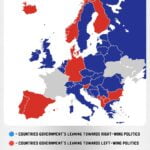The world celebrates the New Year with fireworks and celebrations. You and I are left with a reality of not much to celebrate. If you live in Israel, Gaza, or Ukraine after years of war or the USA struggling to make ends meet – we all face 2025 with our challenges.
I was reflecting on my journey of faith and how a praying mother is the only reason I am still alive. It was not luck or good fortune that spared me the consequences of a life of drink, drugs, and crime. It was God who protected me, to bring me to Himself late in life, in a wonderful demonstration of His Grace.
I am drawn to this story and Augustine’s reflections could be my own. Of another mother at another time long ago…
Monica could be called the “persistent mother.” A North African woman living in the fourth century, Monica was married to Patricius, a pagan, as arranged by her family. She endured significant abuse from her drunken husband, but her greatest challenge came from her oldest son, Augustine.
Monica taught Augustine how to pray when he was a child. When he became seriously ill, he requested baptism; however, after his recovery, he soon forgot about it.
Later, while studying in Carthage, he embraced a hedonistic lifestyle, living with his girlfriend and their son. Monica was so distressed by Augustine’s choices that she would not allow him to eat or sleep in her home. Her heart broke watching his prodigal lifestyle.
Despite their infrequent communication, Monica continued to pray for her son. She requested the bishop to go and counsel her wayward son. After many requests, the bishop advised her that it was better to talk to God about Augustine than to speak to Augustine about God.
He also reassured her: “At present, the heart of the young man is too stubborn, but God’s time will come. It is not possible that the son of so many prayers and so many tears should be lost.”
Augustine’s time came several years later. In Milan, the preaching of Bishop Ambrose profoundly influenced him. Soon after, Augustine found himself torn between his desire to live a chaste life and the temptations of his hedonistic sensual life.
In his distress, he went to an outdoor garden at the place where he was staying. There, he threw himself on the ground under a tree and cried out, “How much longer, Lord? Will your anger remain forever? Please, forget my wrongdoings.”
At that very moment, he heard a neighbor child singing from the other side of the wall. The child kept repeating the phrase, “Tolle lege! Tolle lege!” which means “Take up and read!” Augustine stood up, went inside, and found a Bible that opened to Romans 13.
He read in Romans 13 Verse 12 The night is nearly over; the day is almost here. So let us put aside the deeds of darkness and put on the armor of light.
13 Let us walk honestly, as in the day; not in rioting and drunkenness, not in immorality and wantonness, not in strife and envying.
14 Rather, clothe yourselves with the Lord Jesus Christ and do not think about how to gratify the desires of the flesh.
Ambrose baptized Augustine on Easter Sunday in 387. Soon after, his mother passed away. Just before her death, Monica expressed her contentment, saying, “I do not know what there is now left for me to do or why I am still here. All I wished to live for was to see you converted and become a child of heaven.”
From that time on, Augustine led a virtuous life. He was later ordained and named the bishop of Hippo. Augustine is recognized as one of the great scholars of the early church.
Here are some famous quotes from Augustine:
“Late have I loved you, beauty so old and so new: late have I loved You.
In my unlovely state, I plunged into those lovely created things which You made.
You were with me, and I was not with You.
The beautiful things kept me far from You; though if they did not exist in You, they would have no existence at all.
You called and cried out loud, shattering my deafness.
You were radiant and resplendent; You cast away my blindness.
You were fragrant, and I drew in my breath and now pant after You.
I tasted You, and I am left hungry and thirsty for You.
You touched me, and I am set on fire to obtain the peace which is Yours.”
Later he wrote – “You have made us for yourself, O Lord and our heart is restless until it rests in you.”
These words remind us that no one is beyond God’s reach.
As this year ends and we begin a new, Monica’s story invites us to remain faithful to prayer. If you are praying for a child, spouse, or friend, let her example strengthen your resolve.
Trust that God is at work—even when you cannot see it. This year we may need that faith.
Kind Regards,
A. Volunteer.
PS – For a more in-depth study of this topic – you can find many books on prayer free to download on the website https://servantofmessiah.org/prayer-ebooks/










